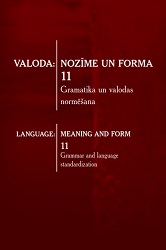Latviešu un lietuviešu gramatikas termini: vārds, vārdšķira un to nosaukumi
Latvian and Lithuanian grammatical terms: word, part of speech and their names
Author(s): Regīna KvašīteSubject(s): Syntax, Lexis, Comparative Linguistics, Baltic Languages
Published by: Latvijas Universitātes Akadēmiskais apgāds
Keywords: Latvian language; Lithuanian language; terms; grammar; word; part of speech;
Summary/Abstract: Latvian and Lithuanian languages have formed different systems of terms to name one of major concepts of linguistics, a vārds ‘word’. In meta-language of grammar, one of the areas of linguistics, this concept is reflected in names of the parts of speech. The aim of the research is to find out the specific characteristics of terminology of grammar in Latvian and Lithuanian languages as well as the trends in coining terms in both Baltic languages. Attention is focused on the use of a related term part of speech (Latv. vārdšķira, Lith. kalbos dalis) and classification of the parts of speech. Names of the parts of speech including the root vārd- in Latvian as well as vard- and žod- in Lithuanian as word basis have been chosen as the research object. The system of the names of the parts of speech in the modern Latvian language comprises terms of both own and foreign origins; moreover, Latvian terms mostly reflect the concept vārds (specific differences occur because of their structure: these may be complex or compound terms). Names of the parts of the Lithuanian speech are usually terms of own origin; however, only a part of them is coined on the basis of the discussed concept, and both roots are used, e. g. daiktavardis (Engl. ‘noun’), būdvardis (Engl. ‘adjective’), įvardis (Engl. ‘pronoun’) and veiksmažodis (Engl. ‘verb’). A question about terms which in both Latvian and Lithuanian languages are used to name the processes of transition from one part of speech to another is connected to the names of the parts of speech. The comparative analysis revealed that terms of foreign (Latin) origin including two – own and international, types of suffixes (-(iz)ācija and -ēšana), dominate in Latvian terminology; whereas in Lithuanian language the priority is given to derivatives from own language (daiktavardėjimas ‘substantivisation’ and the like). In Latvian language, a term of Latin origin, nomens, is also used to name the concept vārds ‘word’; in terminology of Lithuanian grammar, its equivalent is a formation of own language, a compound of both roots under investigation, vardažodis. The review of the history of terms demonstrates that names of the parts of speech in both Latvian and Lithuanian languages were created at the time when terminology of national languages was required for writing textbooks (grammar books) and this work was done by authors of teaching aids and grammar representing both languages.
Journal: Valoda: nozīme un forma
- Issue Year: 2020
- Issue No: 11
- Page Range: 93-117
- Page Count: 25
- Language: Latvian

